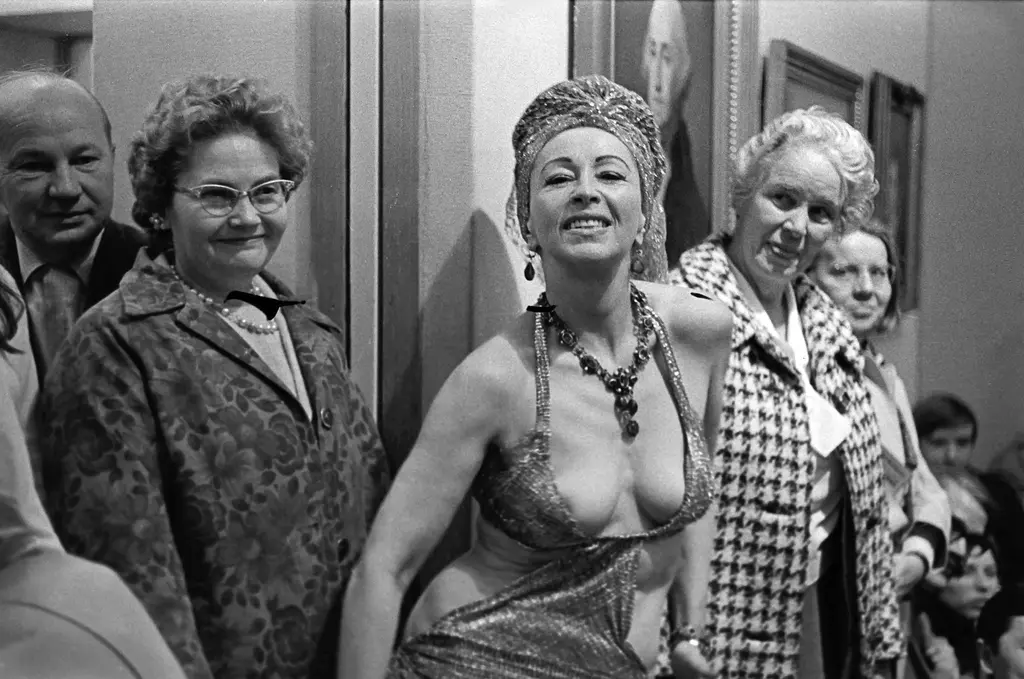The Yes Men Are Revolting
- Text by Alex Robert Ross

Igor Vamos is in his garden when I call him. It seems to be a warm morning in New York City and he’s hanging out with his daughter. She’s offering him flowers and he is graciously accepting.
A week ago I thought that I’d be talking to Igor Vamos about Mike Bonnano, his prankster alter ego and one half of the culture jamming duo The Yes Men. They were, as I had it, semi-separate entities, divided by at least the width of a camera lens or the breadth of a court order. But after watching The Yes Men Are Revolting, I’m not sure which incarnation of the 47-year-old we’re talking about.
The Yes Men’s third film is a more personal affair than their two previous efforts. It deals with the close bond between Vamos and his fellow prankster Jacques Servin (aka Andy Bichlbaum); it lays bare the toll that their work – spanning three decades – has taken on their relationships with their partners and families; it details the crushing lows of failure as well as the soaring highs of successful direct action.
“This one’s more like a movie,” he says. “It actually follows characters, there’s some development, there’s a bit of conflict and resolution. It’s more like a real film.”
In Vamos’ case, that conflict and resolution involves the birth of his third child and the decisions that he had to make between activism and family life, even wondering whether or not they can be split.
So here he is, talking to me on the phone, digging up the garden with his daughter, somehow remaining flawlessly eloquent while simultaneously engaging with his kid.
In many ways it’s remarkable that Vamos has made it to this point without being incarcerated or sued, though he’s come perilously close to both.
A student at the liberal, often radically-minded Reed College in the late 1980s, Vamos founded the now-infamous Guerilla Theatre of the Absurd, his first foray into the ‘culture jamming’ that has since become his trademark. The goal was to intercept and disrupt right-wing activity first at the college and then in the city of Portland more broadly.
“We were into satire,” he says, citing the surrealist humour of Monty Python as an early influence. “I also think at some point in there we became aware that there was a lot of mischief going on in the world; a lot of fun and funny interventions that seemed to make a difference.”
Their early actions included working under the alias of the Barbie Liberation Organization, purchasing roughly 500 Barbie dolls and GI Joes, switching their voice boxes, and returning them to stores.
Then, when some Portland residents opposed changing the name of Front Avenue to Martin Luther King Boulevard in 1990, Vamos mobilised his troops and changed every single road sign on Front, including highway exits, to read ‘Malcolm X Boulevard’ overnight.
When former vice-president and right-wing stalwart Dan Quayle organised a fundraiser for his friend Senator Bob Packwood in Portland, Vamos prepared a project called ‘Reverse Peristalsis Painters’. There the group split into three, dressed in second-hand suits, ate mashed potatoes and food colouring and drank large quantities of the vomit-inducing syrup ipecac. A few minutes later, they puked red, white and blue on the street outside the event.
Watching footage from that day now is difficult, not just because of the vomit, but because of the atmosphere that the prank fostered, pissing off some folks who wouldn’t think twice about throwing a punch at a college kid vomiting the stars and stripes.
But it was the ipecac, not the tension, that unsettled Vamos. “I actually metabolised it and then ended up sick for almost a week. It was three or four days of just being really violently ill. So that one took its toll but not maybe in the way that you’d expect.”
In the coming decades, Vamos’ work would change shape without losing the ability to piss off all the right people. With Servin alongside him, The Yes Men began to impersonate the most irresponsible and wealthy organisations that they could find.
In their debut film in 2003, they set up a fake website for the World Trade Organization, eventually being invited to represent the group at conferences. They would make grand proclamations on behalf of the WTO, admitting to greed and callousness, promising to sort out their past messes, thus forcing the group’s real spokespeople to deny such responsible measures.
In 2007’s The Yes Men Save The World, the duo hatched a plan to impersonate DOW Chemical’s chief spokesperson and offer reparations to the people of Bhopal who are still dealing with the after-effects of the disastrous gas leak that occurred there two decades before, considered the world’s worst industrial disaster. It ended with Servin on BBC World News, speaking to 400 million people, the newsreader and viewers still convinced that he represented the corporation.
That’s been part of a wider shift in the duo’s work, focusing more closely on the link between environmental issues and big business: “When we first started out… we were focusing on the trade regime because there was so much attention on the WTO and trying to figure out how to put the brakes on the neoliberal agenda.

Jacques Servin poses as a DOW Chemical spokesman and accepts responsibility for the Bhopal disaster on BBC World News. The broadcast reached 400m people.
“But in a lot of ways it’s different parts of the same big issue,” he says of the climate’s relation to big business. “I think we’re lucky in that we get to really talk about big issues. A lot of the NGOs for example – like Greenpeace – really have to focus on trying to make that legislative difference.
“We don’t really have to do that,” he says laughing. “There’s nothing to prove to our constituency, so we can talk about really giant problems like the way that the trade regime is connected to climate change.”
Though the concept remains roughly the same on The Yes Men Are Revolting, the duo have unquestionably outgrown their beginnings, reaching out to a new generation of young activists. They’ve started the Action Switchboard to help activists develop and carry out direct action, offering their own expertise where possible.
They are now working with Yansa, a wind-based energy group based in Oaxaca, Mexico whose mission statement is to “facilitate… direct participation in the just transition to renewable energy while ensuring that the communities retain control over their resources.”
That’s a concept that’s perfectly in line with Vamos’ ideals: “Let’s have the local communities own their own wind farms, generate their own electricity, cut out the big companies that are owned only by the richest people in the world,” he tells me. “It’s basically about reorganising our social infrastructure… making sure our decisions contribute to social justice and economic justice at the same time as we address the energy problem.”
This was the essence of his commencement speech at Reed College’s graduation ceremony last year as he implored the graduating class not to “do what you love,” an idea based on privilege, belonging to a generation without a crisis at hand. His message was more direct: “Do what you must.”
Unbeknown to the college president and board, though, Vamos had been working with the students in the weeks before hand, conversing with a group that sought to pressure the college into divesting their endowment in fossil fuels. Almost inevitably, Vamos proclaimed on stage that the college had agreed that morning to divest completely and reinvest in local, renewable, socially run energy instead. The college were forced to deny the claims, but not before national news got hold of the story.
With all this in mind – the endless struggle against the world’s most corrupt people, the global disaster that comes hurtling closer into view with each passing day – it’s easy to assume that Vamos would be pessimistic. But he sees the shoots of change around him, not least in the Occupy Movement.
In the new film, there’s a moment of epiphany at the Movement’s beginnings, a realisation that other people think like them, that millions want to see the same change to the global system. And he still sees that now:
“I think [Occupy] was a huge success and I think it’s not over. I mean, I think that basically it could be seen as a chapter that keeps expressing itself in different ways.
“In the US, most of the protests that we’ve been to, certainly since 1999… you show up and it’s the same old ‘60s hippies who are still there doing it. The culture of protest in youth had declined so much that it was a little bit depressing.”
Occupy’s fiercely democratic outlook, it’s thirst for change and action, inspired Vamos. It offered something new. “It was great to see that resurgence,” he says, “and it contributed to a big feeling of not being alone. And yeah, maybe even hope.”
The Yes Men Are Revolting is currently screening in select theatres around North America. The film is available to watch on iTunes and Vimeo now.
Latest on Huck

Maryam El Gardoum is breaking new shores for Morocco’s indigenous surfers
The Amazigh Atlantic — Through her groundbreaking career and popular surf school, the five-time Moroccan champion is helping women find their places in the waves.
Written by: Sam Haddad

Youth violence’s rise is deeply concerning, but mass hysteria doesn’t help
Safe — On Knife Crime Awareness Week, writer, podcaster and youth worker Ciaran Thapar reflects on the presence of violent content online, growing awareness about the need for action, and the two decades since Saul Dibb’s Bullet Boy.
Written by: Ciaran Thapar

Volcom teams up with Bob Mollema for the latest in its Featured Artist Series
True to This — The boardsports lifestyle brand will host an art show in Biarritz to celebrate the Dutch illustrators’ second capsule collection.
Written by: Huck

A visual trip through 100 years of New York’s LGBTQ+ spaces
Queer Happened Here — A new book from historian and writer Marc Zinaman maps scores of Manhattan’s queer venues and informal meeting places, documenting the city’s long LGBTQ+ history in the process.
Written by: Isaac Muk

Nostalgic photos of everyday life in ’70s San Francisco
A Fearless Eye — Having moved to the Bay Area in 1969, Barbara Ramos spent days wandering its streets, photographing its landscape and characters. In the process she captured a city in flux, as its burgeoning countercultural youth movement crossed with longtime residents.
Written by: Miss Rosen

Tony Njoku: ‘I wanted to see Black artists living my dream’
What Made Me — In this series, we ask artists and rebels about the forces and experiences that shaped who they are. Today, it’s avant-garde electronic and classical music hybridist Tony Njoku.
Written by: Tony Njoku


